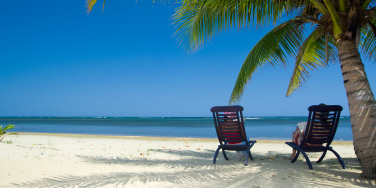
April 19, 2012, by Rob
‘Getting away from it all’: reflections on responsible tourism
Its that time of the year again! The overindulgence of Christmas is but a distant memory. New Years’ dieting resolutions have become derailed by an ‘unholy’ binge on Easter Eggs and golden chocolate bunnies (you know which ones I mean, greedy!). Outside the blossom is bursting, the temperatures are up (more or less) and the false hope of a prolonged, sunny summer has been well and truly seeded by the imposition of an earlier-than-usual hosepipe ban. For me though, this picture of (UK) springtime is not quite complete until I witness the ritualistic disrobing of advertising billboards which, having carried pictures of various cars (and car finance) since Christmas, now celebrate an exotic ‘touristscape’ in an alluring wash of hazy blues, greens and whites. Time to think about booking your summer holiday! But where to go?
Actually, in a consumer culture oriented towards matters of personal meaning, lifestyle and self-identity, this seemingly practical question of where to go on holiday, has become accompanied by the experiential question of how to go? And even who to go as? The fact is that choosing a holiday is more than just about visiting a place, but about experiencing oneself in that place and in various meaningful and self-affirming ways. This phenomenon is reflected in the fragmentation of the classic model of mass tourism – getting away from work – and the proliferation of diverse holiday experiences that now constitute the tourism market. In addition to the ‘usual’ types such as the ‘beach holiday’ , ‘the grand tour’, ‘luxury cruise’ or ‘camping holidays’, tourists can now book a ‘history tour’, ‘factory visit’, ‘slave tour’, ‘war tour’, ‘slum tour’, ‘sex tour’, ‘independent tour’, ‘community tour’, ‘dictator tour’, ‘volunteer holiday’ and even, coming full circle, a ‘working holiday’!
With such a spectrum of possibilities for the tourist experience, one might be forgiven for balking at questions of ethics and social responsibility in this industry. This is further complicated by the truly global scale of tourism and its wide reach into the geo-social, economic and political spaces where holidays occur. Refreshingly, amidst the kaleidoscope of holiday experiences is emerging a growing force of ethically minded consumers, demanding holidays that are responsible towards society and the environment. An ethical niche in the tourism market is now being served by a number of tour operators who have integrated ethics into the ‘holiday product’ via ethical food sourcing policies, higher wages, recycling of materials and energy conservation. With a primary focus on sustaining environments and sharing wealth, the rise of the ‘responsible tourist’ is a tantalizingly promising phenomenon. However, rather than representing a conclusive solution to questions of ethics in tourism, this raises several issues which – though they cannot be fully addressed here- will be featured in a series of forthcoming blogs. The key issues centre on several interrelated questions;
1. To what extent can tourism be responsible for the environment when most holidays (even responsible ones) involve flights to foreign destinations, and require comparatively high usage of resources (e.g. food, water, energy)?
2. To what extent can impacts on people be managed given the inherent power imbalances between tourists and those that deliver the experience?
3. Can social and environmental responsibility be effectively managed through market mechanisms alone?
4. Is there something in the very nature of tourism as a cultural practice that complicates how social and environmental issues are managed?
Everyone goes on holiday – I would be interested to hear your views.
By Dr Rob Caruana, Lecturer in Business Ethics at the International Centre for Corporate Social Responsibility.
Photograph of a remote beach taken by Zoltan Papp and reproduced under creative commons CC BY-NC-ND 2.0. Source: http://www.flickr.com/photos/zoltanp/2567537572/

[…] the last holiday blog I mentioned that tourism, even ostensibly responsible forms of ‘spending time away’, embodies […]